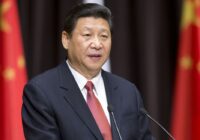Escalating political tension between the United States and China is throttling the exchange of scientific research and making it harder for the US to attract and retain talented Chinese scholars, according to a new study co-authored by University of Pennsylvania Wharton School management professor Britta Glennon.
“Both countries are focused very much on trying to be self-sufficient in science and less international, and this is the opposite of what the trends have been for a long time,” Glennon said. “There’s more of a nationalist shift. We think there hasn’t been as much consideration of what some of the side effects of that might be [on innovation].”
Glennon spoke to Wharton Business Daily about the working paper titled, “Building a Wall around Science: The Effect of US–China Tensions on International Scientific Research,” which was published by the National Bureau of Economic Research. (Listen to the podcast.) Her co-authors are Robert Flynn, doctoral candidate at Boston University’s Questrom School of Business; Raviv Murciano-Goroff, strategy and innovation professor also at BU Questrom; and Jiusi Xiao, doctoral candidate at Claremont Graduate University.
The downturn in US–China relations
When countries are actively at war, the wounds to science are clear: collaboration stops, less money is spent, foreign scientists are often deported and some are even killed. But the effect of a cold war on science is less understood. That’s what the research team wanted to explore.
The scholars analyzed resumes of more than 800,000 American and ethnically Chinese STEM graduates to determine how their careers fared since 2016, when there was a marked downturn in US–China relations with the election of President Donald Trump and the ramp-up of prosecutions of Chinese researchers under what was later known as the China Initiative program. They also examined the amount of published research coming from both groups since then. The results were threefold:
- Mobility — Between 2016 and 2019, ethnically Chinese graduate students became 16% less likely to attend a US-based PhD program, and those who did were 4% less likely to stay in the US after graduation. In both instances, these students were more likely to move to a non-US anglophone country, such as Canada or Australia.
- Building on Research — There was a sharp decline in Chinese usage of American science, as measured by citations. But there was no such decline in the propensity of US scientists to cite Chinese research.
- Productivity — A decline in Chinese usage of US science does not appear to affect the productivity of China-based researchers, as measured by publications. But heightened anti-Chinese sentiment in the US appears to have reduced the productivity of ethnically Chinese scientists in the US by 2% to 6%.
“There’s a huge increase in anti-Chinese sentiment during this time frame. We think that’s really impacting the ability of these scientists to continue to be productive,” Glennon said, noting a Pew Research Center report that found American adults with unfavorable views about the Chinese rose from 55% in 2015 to 66% in 2020.
Connecting science and politics
According to the paper, Trump stoked anti-Chinese hostility during his presidential campaign through consistent rhetoric that China’s rise came at the expense of the US. After taking office, he followed up with a trade war to reduce the US–China deficit and the theft of intellectual property. At the same time, the US Department of Justice launched the China Initiative, investigating Chinese and Chinese-American scientists suspected of stealing IP for the Chinese government. Chinese President Xi Jinping countered with retaliatory moves of his own.
Anti-Asian hate worsened during the COVID-19 pandemic, which is outside the time period of study for the paper. But Glennon said she expects to find a widening gap if the research is updated.
“The tensions are very much mutual. It’s not a one-sided thing,” she said.
The scholars said they understand that national security and economic prosperity are primary objectives for the United States. However, they are concerned about the chilling effect that current policies have on the kind of scientific collaboration that leads to broader benefits for America and beyond.
“There’s a lot of research showing a strong link between immigrants and innovation,” she said. “When you have more immigration, innovation increases quite a lot. It’s not just immigrants doing more patenting and more publishing and startups, but also their effect on Americans.”
[Knowledge at Wharton first published this piece.]
The views expressed in this article are the author’s own and do not necessarily reflect Fair Observer’s editorial policy.
Support Fair Observer
We rely on your support for our independence, diversity and quality.
For more than 10 years, Fair Observer has been free, fair and independent. No billionaire owns us, no advertisers control us. We are a reader-supported nonprofit. Unlike many other publications, we keep our content free for readers regardless of where they live or whether they can afford to pay. We have no paywalls and no ads.
In the post-truth era of fake news, echo chambers and filter bubbles, we publish a plurality of perspectives from around the world. Anyone can publish with us, but everyone goes through a rigorous editorial process. So, you get fact-checked, well-reasoned content instead of noise.
We publish 2,500+ voices from 90+ countries. We also conduct education and training programs
on subjects ranging from digital media and journalism to writing and critical thinking. This
doesn’t come cheap. Servers, editors, trainers and web developers cost
money.
Please consider supporting us on a regular basis as a recurring donor or a
sustaining member.
Will you support FO’s journalism?
We rely on your support for our independence, diversity and quality.










Comment